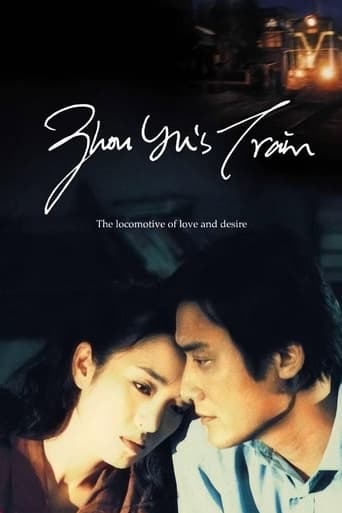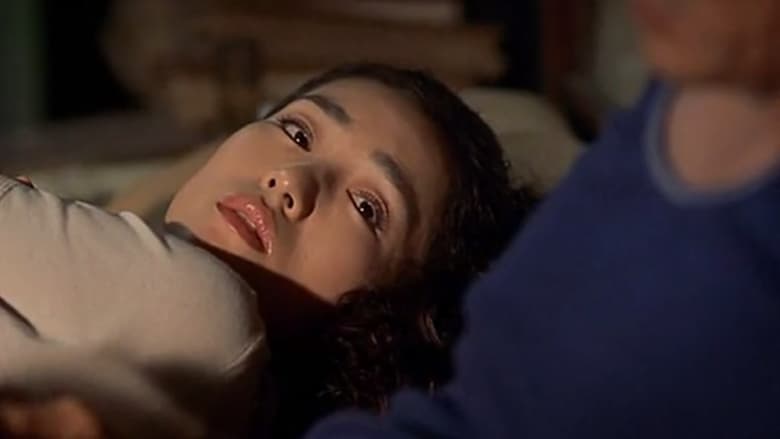

Zhou Yu's Train (2004)
Zhou Yu, a ceramic artisan in China's rural Northwest, has a deep rapport with Chen Qing, a shy sensitive poet. Taking a long train ride every weekend just to make mad passionate love with him, her longing seems insatiable. Until one day, she meets the hedonistic vet Zhang Qiang and begins a torrid affair, which takes her to another train station, and another level of lust. Driven by the locomotive of love and desire, she hustles through a dark tunnel of no return.
Watch Trailer
Cast


Reviews
Zhou Yu's Train is a very slow film without any real narrative flow. It is also over-long and exceedingly boring. Close-up shots of Gong Li "thinking" or slow motion shots of her running seem to go on forever. My main problem is that Gong Li's character comes across as a selfish and spoilt bitch. Just because she is beautiful and everyone wants to "have" her does not make her likable? She sleeps with a man and when he asks the stupid question "Do you like me or the poet?" She replies quite coldly the poet. This is almost verbal castration and extremely cruel.The film is beautifully shot but the settings are cold, ugly and modern. This film so wants to be a poetical and profound but really is nothing more than a humourless and far from entertaining exercise.
Poetic, delicate, subtle. European film with Oriental irisations. Story about love and desire, about power of images and the honey of illusions. Cercles of symbols and chimeric gestures. Time like far lake and the past like only form of present. And a feminine Adonis between two different worlds.The character of Li Gong is a magnificent miniature not of a sensitive age or ambiguous feelings but for a way to define the existence. A way to explore each miracle as part of a sacred refuge, a river-trip. The train and the travels to loved friend, the poems and the house like essential sanctuary of a wonderful past, splendid for his ambiguity, the talks with realistic, sarcastic man for who the dreams are only offals of lost age and Zhou Yu- a pretty prey.For this film, the gestures or words are pieces of intense atmosphere. The search of truth is element of personal religion, the love- delicate shard of beautiful pot. The answers- breath of wind in a spring day. And the time- huge shadow of a way.
Regular readers of my comments know that nearly all my viewing is by recommendation. So, often I will pick a film that I know nothing at all about; this is one of those.My goal is to stumble upon a hidden gem that has escaped all the geniuses I know, that has such power that it takes me by surprise. Friends, if you are reading this and haven't yet seen the film, I have stolen the joy of discovery without knowing; but please do see this. It is precious.It is something between the best of Tarkovsky and what you might like of Kar-Wai Wong.The story is purely in service to the cinematic images, and those are in service to some very pure notions: Poetry as love, love as travel, travel as painting, painting as copying one's self and sending it out, going out as diving into water, diving as love, love as poetry.Unbelievably, each of these concepts is displayed in images of a train. You have to see it to believe it. Trains have been with film since the very beginning, and have been handled by masters. But I have never seen it so thoroughly explored, extended and exhausted as here.The narrative is folded and shifting. It could be a poem, a porcelain painting, a story from each of the four main characters that invents the others. It is quite confusing the first time around.The main thread is in the real world: a porcelain artist falls for a poet in another city. He writes poems for and about her, including her journeys on the train to see him. He gets sent to Tibet. She follows and on the way back is killed in an accident. Later, another woman (played by the same actress) meets the now famous poet and they fall in love. Or do they? This second woman travels on the same train.All of this is chopped and shifted around in presentation, and you have no idea who is telling or seeing what, including several episodes where the first girl also falls for a veterinarian she meets on the train. He may be an imaginary figure. Both the girl and the poet love two people but their bond, at least according to the poems, is much stronger.That's all the story you need to know to not be unsettled and to just go with the flow.What reminds me of Tarkovsky is the way the camera invokes parallel realities as if it glances into the mind as easily as outside a window. The camera is restless and goes to odd places, but once there temporarily becomes meditative. The simplest scenes become blossoms.If you ever loved someone distant, you'll recognize the magic of yearning driving a mythologizing of reality.You have probably seen the actress who plays the two women, Li Gong. She is as good as Liv Uhlmann in the way that Liv is capable of small, flitting expressions that each contain whole lives. She has some American films in production, I see.Please see this.Ted's Evaluation -- 3 of 3: Worth watching.
In comparison to most other Chinese movies, the title of this movie has very significant symbolic meaning, symbolizing the point of no return. It also has an poetic meaning, which neatly related to the plot of the movie which include a poet. This is one of most obvious achievement of this movie, which also makes it a little different from the rest of Chinese movies.The social critic aspect of the movie is rather something ordinary, a theme that is common in most social critic films in contemporary China, and it is none other than the criticism of hedonism, materialism, and other common stuff you would find in Chinese movies about modern China.




